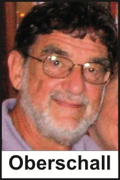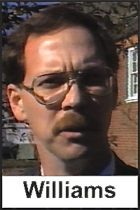Rascals case in brief
In the beginning, in 1989, more than 90 children at the Little Rascals Day Care Center in Edenton, North Carolina, accused a total of 20 adults with 429 instances of sexual abuse over a three-year period. It may have all begun with one parent’s complaint about punishment given her child.
Among the alleged perpetrators: the sheriff and mayor. But prosecutors would charge only Robin Byrum, Darlene Harris, Elizabeth “Betsy” Kelly, Robert “Bob” Kelly, Willard Scott Privott, Shelley Stone and Dawn Wilson – the Edenton 7.
Along with sodomy and beatings, allegations included a baby killed with a handgun, a child being hung upside down from a tree and being set on fire and countless other fantastic incidents involving spaceships, hot air balloons, pirate ships and trained sharks.
By the time prosecutors dropped the last charges in 1997, Little Rascals had become North Carolina’s longest and most costly criminal trial. Prosecutors kept defendants jailed in hopes at least one would turn against their supposed co-conspirators. Remarkably, none did. Another shameful record: Five defendants had to wait longer to face their accusers in court than anyone else in North Carolina history.
Between 1991 and 1997, Ofra Bikel produced three extraordinary episodes on the Little Rascals case for the PBS series “Frontline.” Although “Innocence Lost” did not deter prosecutors, it exposed their tactics and fostered nationwide skepticism and dismay.
With each passing year, the absurdity of the Little Rascals charges has become more obvious. But no admission of error has ever come from prosecutors, police, interviewers or parents. This site is devoted to the issues raised by this case.
On Facebook
Click for earlier Facebook posts archived on this site
Click to go to
Today’s random selection from the Little Rascals Day Care archives….
Click for earlier Facebook posts archived on this site
Click to go to
Today’s random selection from the Little Rascals Day Care archives….
Why would prosecutors let ‘monster’ walk?
Jan. 18, 2012
“One way or another, justice has failed miserably in the agonizing case of the Little Rascals Day Care…. Last week, eight years after launching an investigation into possible sex abuse at the center, prosecutors announced they were dropping all charges against those who worked at the center.
“That means one of two things:
“(1) Either the defendants originally charged with hundreds of allegations of sex abuse in the 1980s are going to go virtually unpunished for their unspeakable deeds; or
“(2) Those same defendants have been badly treated by an overzealous prosecution team that broke all the rules of fairness in winning flawed guilty verdicts….”
– Editorial in The Charlotte Observer, May 29, 1997
So was that “overzealous prosecution team” simply blindered true believers, or did they realize early on their case was rotten to the core?
Defendant Scott Privott, who pled no contest and was released on probation after spending more than three years in prison, cuts through to the truth when he asks:
“Why did they offer me a plea? You know, if I’m supposed to be the monster that they said I was, if I did these crimes that they said I did, why would they offer me a plea?”
Why indeed, H.P. Williams?… Nancy Lamb?… Bill Hart?
An expertise ‘contrary to science and common sense’
 March 7, 2013
March 7, 2013
Anthony Oberschall’s “Why False Beliefs Prevail: the Little Rascals Child Sex Abuse Prosecutions” appeared in “Essays in Honor of Raymond Boudon” (2000).
Most saliently, the UNC sociologist argues that “hysteria” and “moral panic” are inadequate to describe what happened in Edenton. Rather, he sees the town – and the Little Rascals defendants – as victims of the purveyors of “pseudoscience”:
“When child sexual abuse became a national issue, the medical profession, academic psychology and social science were just starting to study it scientifically…. The legal profession lacked experience with trial testimony of pre-schoolers and admission of hearsay testimony by parents and therapists….Meanwhile thousands of child sex abuse allegations had to be dealt with.
“In the absence of proven knowledge, a child sex abuse industry of self-appointed ‘experts’ based on pseudo-science filled the demand for training and informing child protection service workers, social workers, police investigators, prosecutors, therapists and others…. They were convinced they were saving America’s children, even though their methods and knowledge were contrary to science and to common sense. In Edenton, the prosecution and the investigators relentlessly labored to supplant common sense with false beliefs based on pseudo-science, (and) they succeeded….”
Working with UNC journalism student David Loomis on his master’s thesis detailing news coverage of the case, Oberschall “tried to survey Edenton households by mail (picked names at random from a phone book), but got less than a 10 percent return rate. It was obvious people there didn’t want anything to do with an outsider, a scholar.”
Rebuffed, Oberschall drove to Edenton himself and conducted perhaps a dozen interviews, which he made use of both in “Why False Beliefs Prevail” and in this more detailed draft working paper from 2010.
Case was boon to DA’s team of therapists
Dec. 19, 2011
“In the Little Rascals case, a handful of therapists were compensated by the state for evaluating and ‘treating’ the child witnesses. But there seemed to be other motivations for these therapists to become ‘investigators’ for the district attorney’s office. According to one mother’s testimony, one therapist seemed to have a vested forensic role.
“ ‘(The therapist) evidently had been involved in this for a long time, and she was planning on flying in experts and FBI people from everywhere, because she thought this was going to be bigger than the McMartin Preschool case in California…. And she wanted to get on this one right away, wanted to get all of these expert people in here because she knew there was a lot more to to it.’ ”
– From “Jeopardy in the Courtroom: A Scientific Analysis of Children’s Testimony”
by Stephen J. Ceci and Maggie Bruck (1995)
Imagining my part of a chat with H.P. Williams Jr.
Dec. 9, 2011
 Had former district attorney H.P. Williams Jr. let our conversation drag on beyond 30 seconds on Wednesday, here are some questions I might have asked:
Had former district attorney H.P. Williams Jr. let our conversation drag on beyond 30 seconds on Wednesday, here are some questions I might have asked:
– In all the day care cases of the ʼ80s and early ʼ90s – Little Rascals, McMartin, Fells Acres, Wee Care, ad nauseam – why was not one instance of sexual abuse ever witnessed by an adult?
– Why was not one piece of physical or medical evidence ever presented?
– Would you still argue at Bob Kellyʼs sentencing hearing that “There is no reason he should be restored to the community at any time”?
– Have you been surprised that, since being freed, not one of the defendants has returned to a life of serial child sexual abuse?
– What would it take for you to admit the Edenton Seven were innocent?
● ● ●
If H.P. Williams Jr. – or any other reader – would like to respond, he is always welcome to do so here.











0 CommentsComment on Facebook